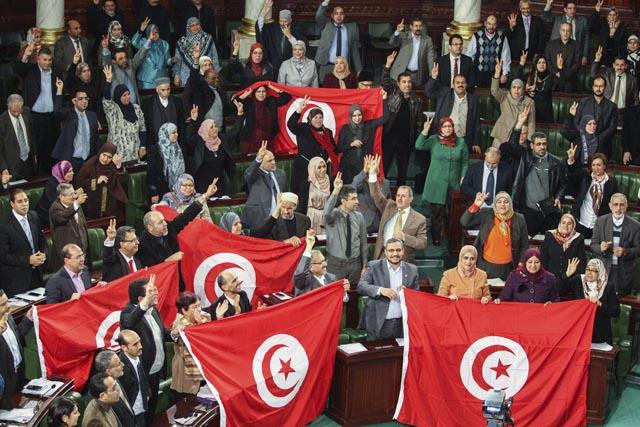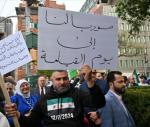TUNIS — Tunisians marked the third anniversary Tuesday of the ending of years of dictatorship in the first Arab Spring uprising but political bickering prevented adoption of a new constitution by the symbolic target date.
Tunisia’s leaders held a low-key ceremony in the Kasbah district of the capital, where the government’s headquarters are located, to commemorate the January 14, 2011, overthrow of veteran strongman Zine El Abidine Ben Ali.
President Moncef Marzouki, outgoing prime minister Ali Larayedh and his designated successor, Mehdi Jomaa, attended the ceremony along with other top officials.
Amid tight security, thousands of flag-waving Tunisians rallied peacefully along Habib Bourguiba Avenue, epicentre of the mass protests that drove Ben Ali from power and inspired revolts across the Arab world.
The demonstrators included both supporters and critics of Ennahda, the moderate Islamist party that was voted to power after Ben Ali’s downfall, but which finally resigned last week under an agreement to end months of political turmoil.
The failure of Tunisia’s political factions to adopt the long-delayed new constitution has clouded the celebrations.
Lawmakers previously agreed to do so by Tuesday, but the national assembly, which was due to meet early in the afternoon to continue scrutinising the draft charter, had not convened by 1500 GMT, and no new deadline has been set for ratification.
A third of around 150 articles in the text have yet to be examined after nearly two weeks of debate, and key provisions have been rejected by lawmakers during fractious sessions in parliament in recent days.
These include articles on the eligibility criteria for the head of state and the prerogatives of the prime minister.
Lawmakers also rejected an article on the government’s role in nominating judges, after an acrimonious debate.
“We must prepare the country for the constitution that it deserves,” Ennahda official Ajmi Lourimi told Islamist demonstrators.
“The time for military coups is past, because the people will defend their revolution,” he added, referring to the military overthrow last July of elected Islamist president Mohamed Morsi after a single year in power in fellow Arab Spring country Egypt.
In turn, opposition leaders took a swipe at Ennahda.
“Despite the difficulties, the obstacles and the deception of the people, this revolution was made to succeed,” said Issam Chebbi, a leader of the Republican Party.
Tunisians are awaiting the formation of a caretaker government of technocrats under Mehdi Jomaa, the non-partisan former industry ministry tasked on Friday with leading the country to fresh elections and getting the transition back on track.
His appointment followed the voluntary resignation of Ennahda, which had headed the coalition government since its election triumph in October 2011.
Its tenure was dogged by a sharp rise in Islamist violence, persistent social unrest and a political crisis triggered by the assassination of opposition MP Mohamed Brahmi last July by suspected jihadist militants.
Transition has taken ‘too long’
Ennahda’s veteran leader Rached Ghannouchi, in an interview with French newspaper Le Monde, said the delays in establishing functioning state institutions had been a mistake.
“This transition lasted too long. All the problems occurred in the second year [of Ennahda’s rule] because it took too long, even if, of course, this was not done on purpose,” Ghannouchi said.
“From the beginning, we made the mistake of thinking we could do everything in a year.”
Separately, the secular president admitted in a speech on Monday that the country’s leaders had not satisfied the hopes that accompanied the uprising three years ago.
“We are very far from realising the objectives of the revolution,” Marzouki said, while adding that Tunisia was on “the right track, [even if] the path is still difficult and dangerous”.
The country has suffered a wave of attacks blamed on jihadist militants in the past year, and a growing number of strikes and protests in recent months that have often turned violent.
The protests were concentrated in Tunisia’s deprived central region, where a young street vendor sparked the revolution by setting himself on fire in December 2010 to protest his impoverished circumstances.
















